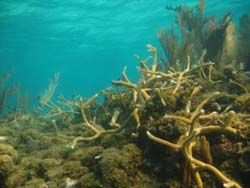New study of Glover's Reef challenges whether corals will benefit from Marine Reserves' protection

A new study conducted by Brittany Huntington, Mandy Karnauskas and UM Professor Diego Lirman appears in the journal Coral Reefs. Its authors tested whether 10 years of reserve designation has translated into positive impacts on coral communities in Glover’s Reef Marine Reserve, Belize. Results from their surveys showed no clear indication of reserve implementation benefiting coral cover, colony size or the abundance of juvenile corals. Credit: Image courtesy of Brittany Huntington<br>
A team of scientists from the University of Miami (UM) Rosenstiel School of Marine & Atmospheric Science recently tested whether 10 years of reserve designation has translated into positive impacts on coral communities in Glover's Reef Marine Reserve, Belize.
Results from their surveys of 87 patch reefs both inside and outside the marine reserve showed no clear indication of reserve implementation benefiting coral cover, colony size or the abundance of juvenile corals. The study, conducted by Brittany Huntington, Mandy Karnauskas and UM Professor Diego Lirman appears in the journal Coral Reefs.
“We had hoped to find evidence of reserve protection benefiting the coral community as well as the fish community at Glover's Atoll. Unfortunately, the coral communities on protected reefs were in no better condition than the fished reefs,” says Huntington.
Rather, the scientists documented declines in the coral community both inside and outside of the marine reserve. These patterns of coral decline at Glover's Reef, including a shift in dominance from massive reef-building broadcasting species to smaller brooding species, and low numbers of juvenile corals were documented and seem reflective of regional patterns of coral decline in the Caribbean.
The scientists detected no difference in herbivorous fish abundances or the abundance of macroalgae dominating the reef between reserve and fished sites. This provides a potential explanation for the lack of cascading effects on the coral community.
“The macroalgae is faster growing than corals, dominating the available free space on the reef and impeding coral growth and survival,” said Huntington. “Without greater numbers of herbivorous fishes in the reserve to consume the macroalgae that is dominating these reefs, corals have little chance at recovery.”
The UM team also found that massive broadcasting coral species exhibited greater losses over time than their smaller-sized counterparts, suggesting that local management actions have not alleviated the trend of high mortality for these species.
“Glover's Marine Reserve provides a unique opportunity to learn more about how marine reserves impact coral and fish populations,” says Karnauskas. “Reserves that are not designed and implemented specifically for the protection of the coral community may fail to provide benefits to these species.”
About the University of Miami's Rosenstiel School
The University of Miami is the largest private research institution in the southeastern United States. The University's mission is to provide quality education, attract and retain outstanding students, support the faculty and their research, and build an endowment for University initiatives. Founded in the 1940's, the Rosenstiel School of Marine & Atmospheric Science has grown into one of the world's premier marine and atmospheric research institutions. Offering dynamic interdisciplinary academics, the Rosenstiel School is dedicated to helping communities to better understand the planet, participating in the establishment of environmental policies, and aiding in the improvement of society and quality of life. For more information, please visit http://www.rsmas.miami.edu
Media Contact
More Information:
http://www.rsmas.miami.eduAll latest news from the category: Ecology, The Environment and Conservation
This complex theme deals primarily with interactions between organisms and the environmental factors that impact them, but to a greater extent between individual inanimate environmental factors.
innovations-report offers informative reports and articles on topics such as climate protection, landscape conservation, ecological systems, wildlife and nature parks and ecosystem efficiency and balance.
Newest articles

Properties of new materials for microchips
… can now be measured well. Reseachers of Delft University of Technology demonstrated measuring performance properties of ultrathin silicon membranes. Making ever smaller and more powerful chips requires new ultrathin…

Floating solar’s potential
… to support sustainable development by addressing climate, water, and energy goals holistically. A new study published this week in Nature Energy raises the potential for floating solar photovoltaics (FPV)…

Skyrmions move at record speeds
… a step towards the computing of the future. An international research team led by scientists from the CNRS1 has discovered that the magnetic nanobubbles2 known as skyrmions can be…





















